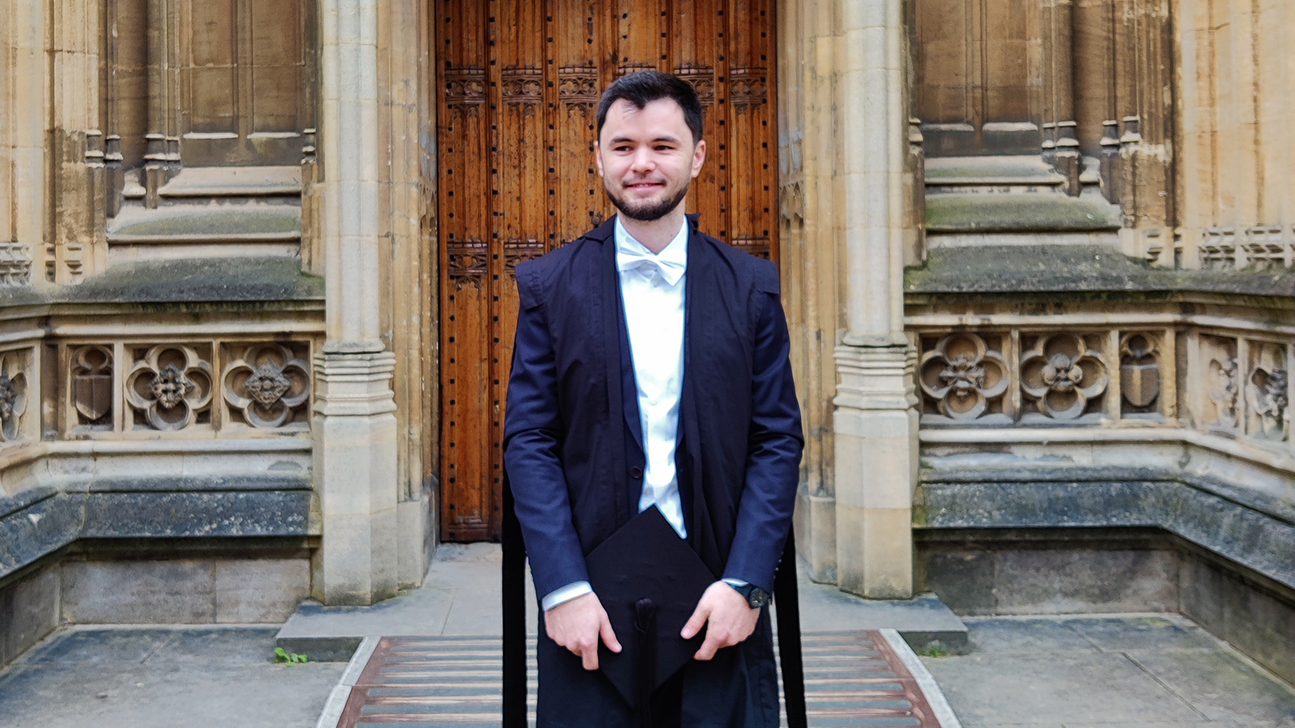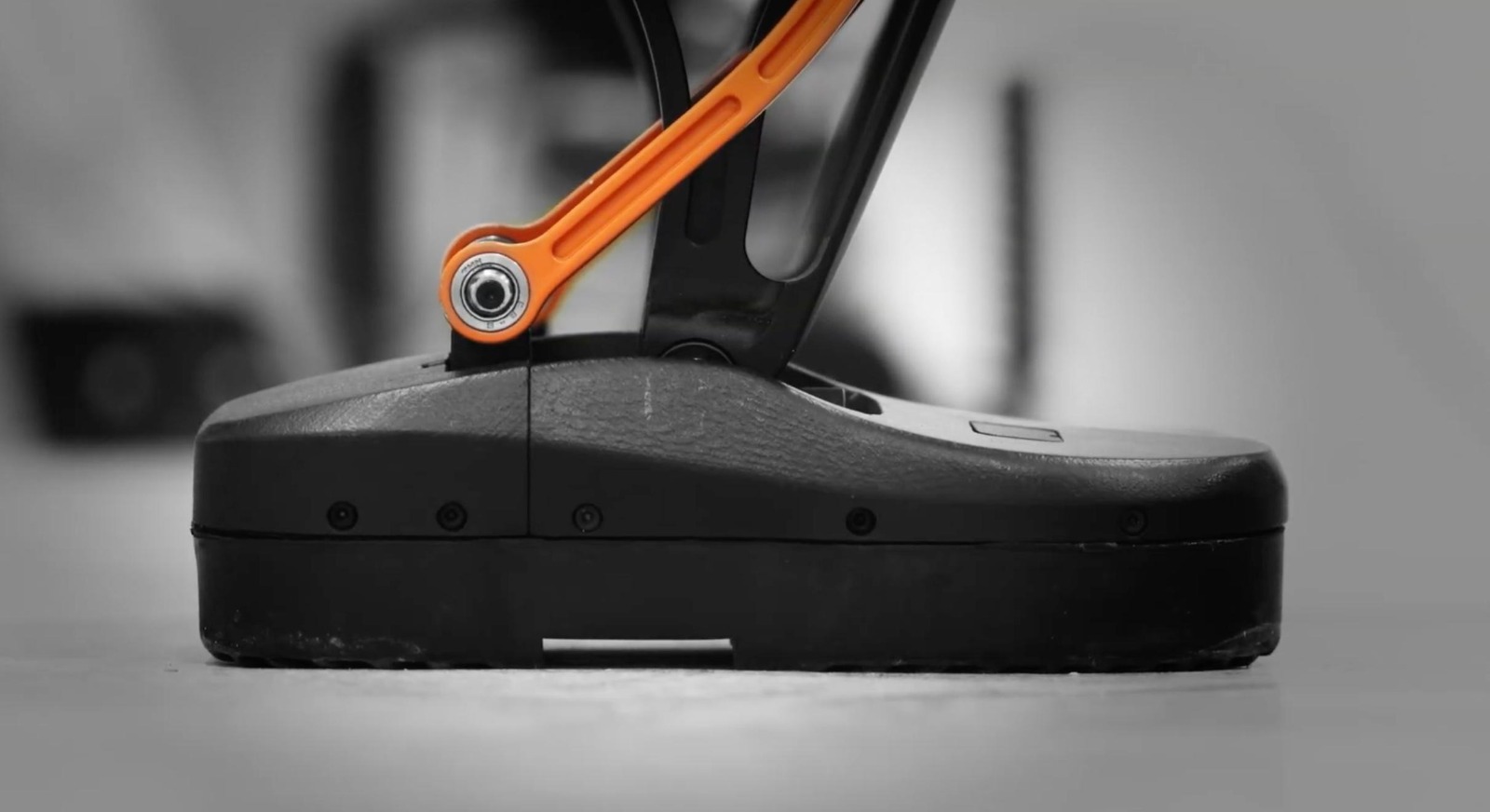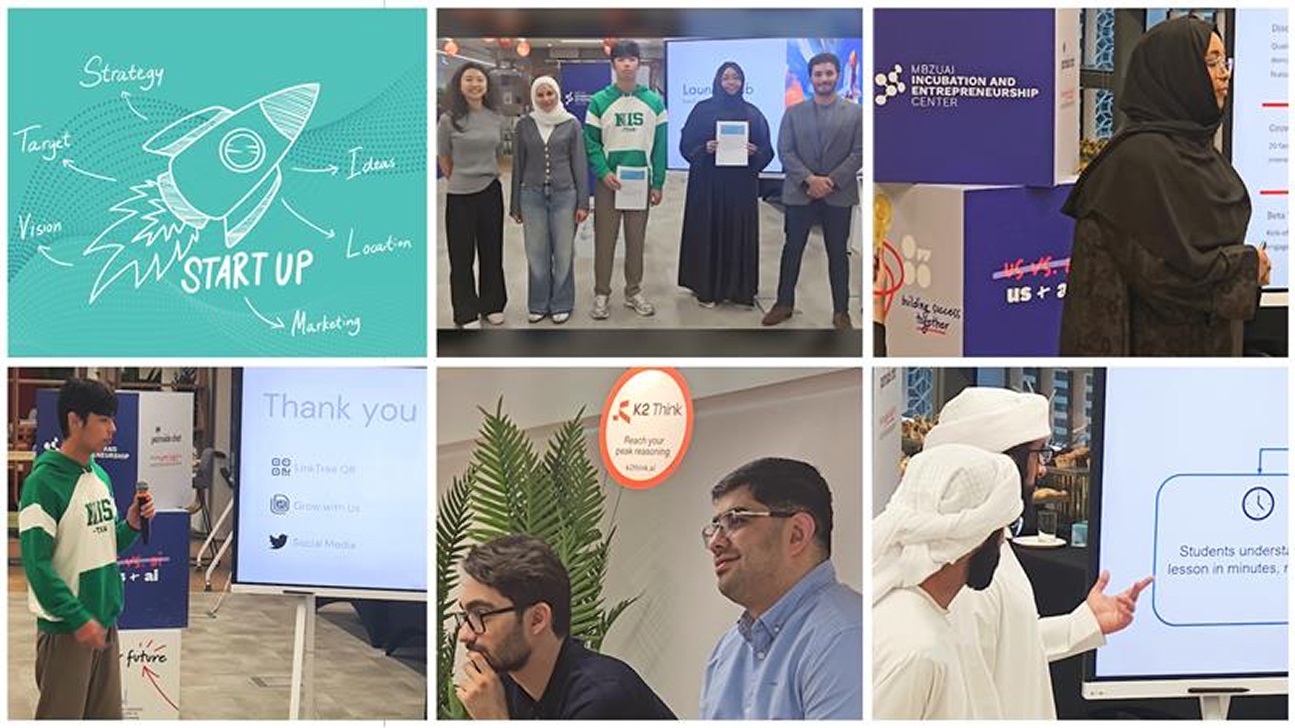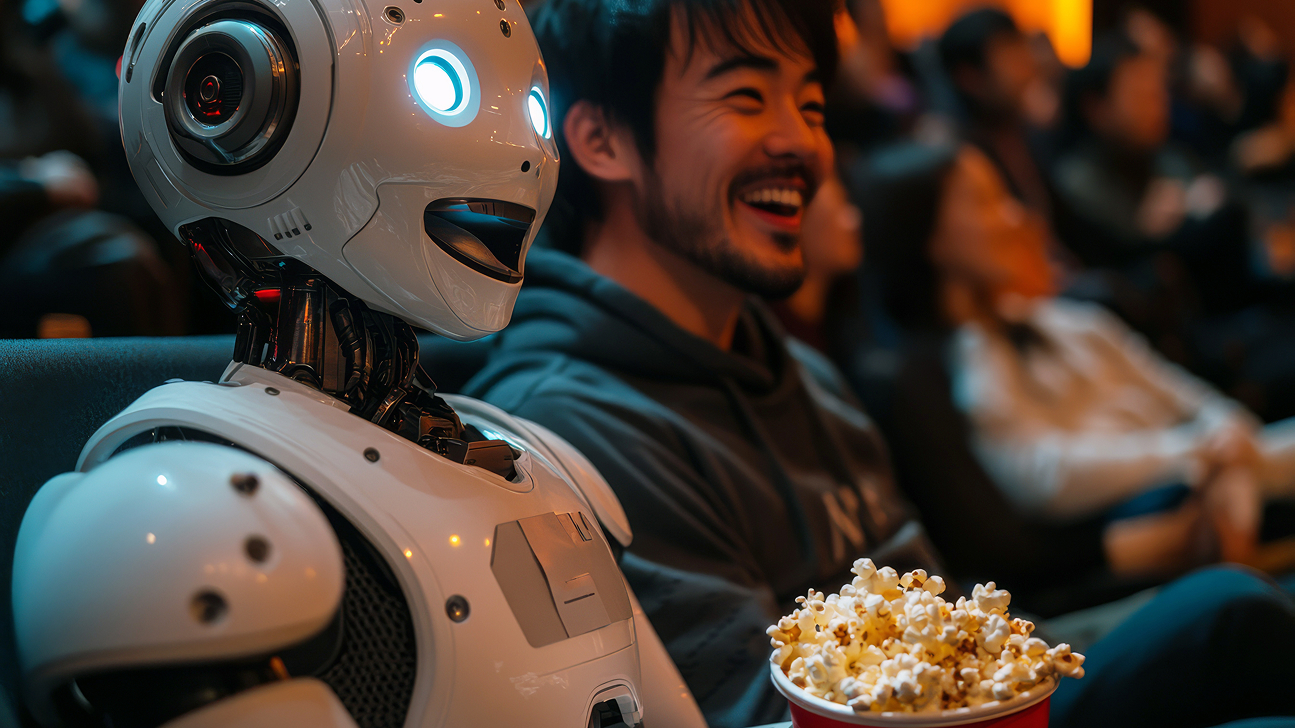Alumni Spotlight: putting AI at the heart of healthcare
Wednesday, September 24, 2025

When Ikboljon Sobirov talks about his research in AI-powered diagnostics for cardiovascular disease, he doesn’t begin with theory – he begins with family.
“Both my grandfather and my uncle died of heart attacks,” he says. “My other uncle also had a heart attack. He’s alive, but walks with a cane as a result. So this work came out of a very personal kind of pain.”
Now a Ph.D. candidate at the University of Oxford, the MBZUAI alumnus is helping to build a new generation of diagnostic tools that could catch and treat heart disease long before it strikes. And just as he’s using his family’s experience as motivation for his work, he’s also using it as the foundation.
“I knew from a young age that I would go into the field of technology,” he says. “Applied Math – specializing in Computer Engineering – is what my mom did for her studies, so I followed in her footsteps. I knew even before I went into my undergraduate studies that I wanted to specialize in information technology.”
Now, having journeyed for his education from his family home in Andijan, Uzbekistan, to Tashkent, to the then newly launched MBZUAI in Abu Dhabi, and finally to the dreaming spires of Oxford, he is not only specializing in technology but also working at its cutting edge to improve healthcare for all.
Images, innovation, and impact
Sobirov joined Somerville College at the University of Oxford at the start of 2024, applying AI to cardiovascular medicine with the goal of making diagnosis and treatment more precise and less invasive.
His research centers on building imaging biomarkers – signals found in medical scans that can reveal the underlying biology of disease.
“Biomarkers are essentially biological indicators of a person’s current status that can then enable precision or personalized medicine,” he says. “Imaging biomarkers are image versions of these. So you can take a CT scan of a person, for example, look at the information in the image, and tell whether or not particular targeted medicine is affecting the biology, how it’s affecting it at different dosages, and what the long-term effects might be on different outcomes such as a heart attack or stroke.”
What makes his work particularly innovative is the integration of transcriptomic data – information about which genes are active in the body – with imaging data. The goal: to predict how a patient will respond to specific medications – using only images.
“What we’re trying to do from a technical point of view is to understand the link between imaging information with the transcriptomic or RNA information,” says Sobirov, who also serves as Chief Technology Officer of the Oxford BioTech Society. “Once we build our link and understand the bridge between the two, then we can use the imaging information to represent the RNA data.
“This is useful because pharmaceutical companies who develop particular targeted medicine would be able to test their medicines’ effectiveness. If they’re targeting a particular gene pathology, for example, they could use our technology without having to do any physical trials.
“Doctors would also be able to create better diagnosis and prognosis according to the individual patient and the medicine that is being used.”
Sobirov’s research is being conducted within an academic-industry partnership, thanks to his industrial fellowship with Caristo Diagnostics – a medical AI company spun out of the same Oxford lab he is working at. This fellowship, which spans the entirety of his Ph.D., funds his tuition and pays a monthly stipend, helping him to stay fully-focused on his work.
“The research is being conducted within the lab at the university, and then getting implemented in the real world by Caristo. We get the IP, then it transitions to commercialization.”
This blend of advanced research and real world application reflects not only Oxford’s model of impact-driven science, but also Sobirov’s own mission to transform personal experience into medical innovation.
Why this matters
The implications of Sobirov’s work go far beyond lab innovation. Cardiovascular disease is often called a ‘silent killer,’ developing quietly over years before a major event like a heart attack or stroke. Current diagnostic tools often only detect problems once damage is already advanced.
By building models that connect imaging biomarkers with genetic activity, Sobirov and his colleagues are working toward the possibility of detecting cardiovascular disease up to a decade before symptoms appear.
“Imagine being able to look at a routine scan and not only see whether the arteries are blocked today, but also predict whether a person is at high risk of a heart attack 10 years down the line,” Sobirov says. “That gives doctors a huge window to intervene early – through lifestyle changes or targeted therapies – and potentially prevent the disease entirely.”
If realized at scale, this kind of early diagnosis could save millions of lives worldwide and reduce the heavy economic burden of cardiovascular disease on healthcare systems.
Expanding his ecosystem
Sobirov’s path to Oxford was forged at MBZUAI in Abu Dhabi – not only by his own academic excellence, but also by his supervisor at the University, Mohammad Yaqub, Associate Professor of Computer Vision.
“Towards the end of my Master’s at MBZUAI, I was lucky enough to come to Oxford as a visiting fellow,” he says. “That was thanks to Dr. Yaqub, who initiated the project there and helped me transition throughout the whole process with documentation and everything else.
“He is a graduate of Oxford and still has very close ties, so he knows a lot about the city. He gave me lots of suggestions of what to do here, which made things so much easier. I was here for about three months in the summer of 2022 before going back to Abu Dhabi. But I continued working with the Oxford team online as I was wrapping up my Master’s. That led to me securing a place here.”
With the help of a Travel and Special Project Grant from the Horsman Fund by Somerville College and full funding by AstraZeneca to attend the AI and Machine Learning Summer School, CCAIM, University of Cambridge, Sobirov has been able to deepen his research, which is a natural progression of his work at MBZUAI.
Joining as a Master’s student in January, 2021, he was part of the University’s first ever cohort, and was immediately attracted to Yaqub and his work.
“When I spoke with Dr. Yaqub, I was hooked,” he says. “We discussed my family’s history with cardiovascular disease, and he proposed a particular project. I could immediately see how it could make a difference in people’s lives.”
While at MBZUAI, Sobirov had the opportunity to expand his field of research into other areas, such as oncology, in which he also excelled.
“During summer 2021, Dr. Yaqub suggested I participate in the HECKTOR challenge, which is part of MICCAI – the biggest medical imaging conference. It’s a challenge for head and neck tumors, tumor segmentation, and prognosis. Our team ended up winning the competition and getting a publication out of it.
“The whole environment at MBZUAI was wonderful. I very much enjoyed being part of that experience and learning so much – it helped me develop tremendously, and opened up so many opportunities.”
Back in Oxford, Sobirov has settled comfortably into his new pace of life, which he says is less publication-heavy, and more focused on collaboration with the wider healthcare ecosystem.
“There is a different mindset between the two universities, which has taken some time to get used to,” he admits. “For example, as part of my Ph.D. I don’t have any obligation to make a publication. I can graduate without one, as long as my research is worthy.
“In a year and a half I still haven’t had a publication, which made me very anxious until I spoke to my professor, Professor Charalambos Antoniades. He convinced me that this is a good thing because we’re taking our time to put big things together, which will then combine to an even bigger thing, which we can then submit as a huge paper. So yes, there are these little differences.”
He also believes Oxford’s collaboration ecosystem is a precursor to where MBZUAI is headed.
“Oxford is very old, and MBZUAI is very young,” he says. “Oxford University’s ecosystem has developed over a long period of time, and has grown into a very strong global network with other universities, hospitals and companies around the world. When I started at MBZUAI, it was just starting on that journey. But it has been developing its industrial and academic partners a lot since then. It will be interesting to see how it grows in that direction.”
Sobirov’s own growth will also be one to watch. From Uzbekistan to the UAE to the UK, he has built on each experience to reach new heights and create greater impact. And the continued accumulation of his research could have widespread tangible benefits, as he works to improve healthcare for all.
- healthcare ,
- innovation ,
- biomedical ,
- medicine ,
- alumni ,
- Ph.D. ,
- Alumni Spotlight ,
- medical imaging ,
Related
MBZUAI and Minerva Humanoids announce strategic research partnership to advance humanoid robotics for applications in the energy sector
The partnership will facilitate the development of next-generation humanoid robotics tailored for safety-critical industrial operations.
Read MoreMBZUAI's Launch Lab equips alumni and students with practical startup tools
The six-week pilot program brought alumni and students together to turn early startup ideas into tangible ventures.
- launch lab ,
- alumni relations ,
- startups ,
- alumni ,
- entrepreneurship ,
AI and the silver screen: how cinema has imagined intelligent machines
Movies have given audiences countless visions of how artificial intelligence might affect our lives. Here are some.....
- science fiction ,
- cinema ,
- art ,
- fiction ,
- artificial intelligence ,
- AI ,


